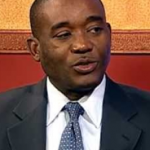The power at Miami-Dade County Hall is going to shift over the next few weeks as commissioners play musical chairs.
Not only because they are expected on Monday to name the next chair, and all eyes are on Commissioner Jean Monestime for that. But also because in January, Monestime will dole out the committee leadership positions that are the real reason why they are there, the much more coveted roles of each elected on that half-moon dais — and where the real power lies.
and all eyes are on Commissioner Jean Monestime for that. But also because in January, Monestime will dole out the committee leadership positions that are the real reason why they are there, the much more coveted roles of each elected on that half-moon dais — and where the real power lies.
Most people don’t realize this, but commissioners have two elections, really. The one with the general voters on Election Day is just to get into the running for the true positions of influence — juicy committee appointments. That will be decided in the next few weeks as Monestime judges his colleagues loyalty and the level of their commitment to his agenda.
Since the Florida in the Sunshine Law prohibits electeds from meeting outside the public view to talk about anything they may vote on in the future, most if not all commissioners have go-betweens (read: lobbyists, consultants and insiders) who will push for their desired appointments and, typically, backroom deals would already be getting cut right about now on who gets what.
Because the chairs of each committee really are the ones who move items forward through the agenda. If they don’t like a project, it won’t see the light of day. If they do, or someone makes them like it, it will be ushered through.
And there are some committees that are more powerful and more coveted than others. The golden appointments are transportation and aviation,  finance, infrastructure and capital improvements, economic development and Port of Miami, land use and development. The health and social services, public safety and animal services, and culture and recreation committees are seen as second tier. That’s how the committees are structured now, of course, but Monestime could also change them. He could put aviation and Port of Miami together. He could separate public safety and animal services. He could also change the functions of the committees. Sosa, for example, took procurement out of the infrastructure committee, rendering it less powerful, and put it into the finance committee.
finance, infrastructure and capital improvements, economic development and Port of Miami, land use and development. The health and social services, public safety and animal services, and culture and recreation committees are seen as second tier. That’s how the committees are structured now, of course, but Monestime could also change them. He could put aviation and Port of Miami together. He could separate public safety and animal services. He could also change the functions of the committees. Sosa, for example, took procurement out of the infrastructure committee, rendering it less powerful, and put it into the finance committee.
Conversations on these committee appointments — chairmanships as well as memberships — have been going on for weeks. Because on Monday, each commissioner’s valuable vot e will be cast for the man or woman who makes those decisions single-handed: The chair. After newly-minted Commissioner Daniella Levine Cava is ceremoniously sworn in (ya she got the official swearing in this week), the commission will choose the chair and vice chair to replace Commissioner Rebeca Sosa and former Commissioner Lynda Bell, who have served, respectively, for two years.
e will be cast for the man or woman who makes those decisions single-handed: The chair. After newly-minted Commissioner Daniella Levine Cava is ceremoniously sworn in (ya she got the official swearing in this week), the commission will choose the chair and vice chair to replace Commissioner Rebeca Sosa and former Commissioner Lynda Bell, who have served, respectively, for two years.
The commission historically likes to rotate that position to reflect the diversity on the board and this year it is a black commissioner’s turn. Or so Ladra is told over and over again. Dennis Moss has been chair twice already. And Ladra hears that Barbara Jordan, who was nominated two years ago but lost to Sosa, is no longer interested. She realizes it’s a headache and she’s a fighter, not a lover. In other words, being the chair sort of forces one to be more collegial and “kumbaya everybody” and discourages one from being disruptive and confrontational. We’d miss that, Barb.
Audrey Edmonson did want it and was reportedly backed by Mayor Carlos “Cry Wolf” Gimenez and his BFF, lobbyist Jorge Luis Lopez. But maybe that is why she has failed to muster the votes. That or because, as we hear, she’s burned too many bridges. But, rather, others (read: lobbyists, consultants and insiders) have been advocating for Monestime, who would make history and become the first Haitian American in the U.S. to be elected to the chairmanship of such a government body.
There’s more. Please press this “continue reading” button to “turn the page.”
Pages: 1 2

